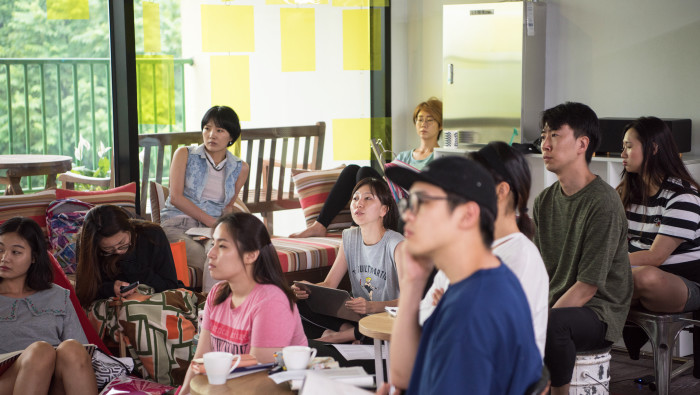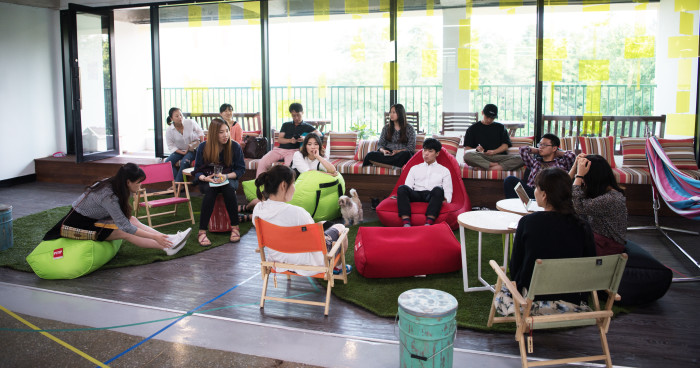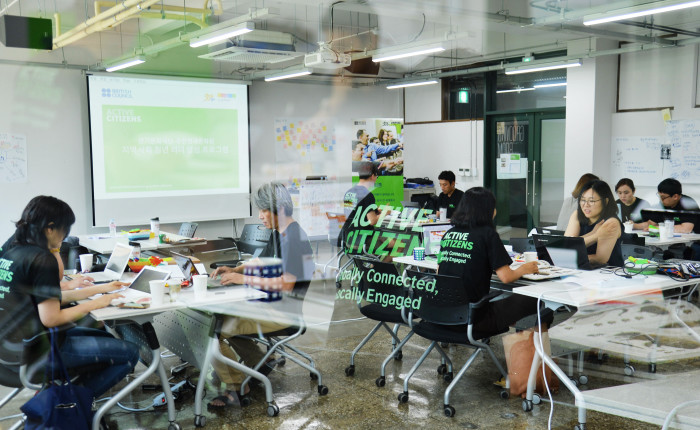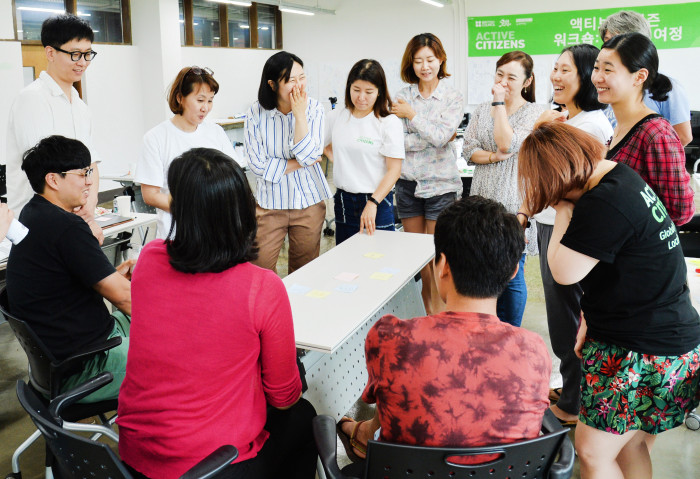경기문화재단
Power of Thinking, Power of Arts And Culture Education (2)
Arts and Culture Education For Young People On GyeongGi Sangsang Campus*
Cultural Policy is a quarterly magazine published by the Gyeonggi Cultural Foundation since the summer of 2017 with the purposes of identifying new trends in cultural policies at home and abroad, gathering the opinions of experts in relevant areas, and introducing the directions and contents of diverse cultural policies promoted by Gyeonggi Provincial Government and Gyeonggi Cultural Foundation. |
Writer | Kyunghwa Ahn
For young people who completed basic public education, we need to provide arts and culture education of new concept. According to Russell, they lost their thinking system while being educated. Or to some point, they forgot how to think creatively. Thus, arts and culture education needs to be something that revitalizes their intellectual adventurous spirit of childhood. In the same vein, Sangsang Campus’ education programs for young people primarily focus on training cultural planners capable of reading the world themselves, rather than sticking to what they already read.
The age group of ‘young people’ differs even inside GyeongGi-do Province, depending on projects. On Sangsang Campus, ‘young people’ refer to those aged between 20 and 39. Dasari School attempts to foster young cultural planners who will plan and lead local regeneration and the local community’s invigoration through culture. The School tries to find and develop its own language to freely imagine and experiment with the future. In Korean, dasari means to “let everyone speak out to be alive.” Serving as the catchphrase of Korean independence activist Jae-hong Ahn, dasari describes the nature of the School that would like to come up with plans allowing everyone to speak out freely and creatively to live better.

Dasari School was founded in 2014 by GyeongGi Cultural Foundation, before the launch of Sangsang Campus. When gathering the first students in 2014, anyone with the ‘youth spirit’ who is 25 years or older was able to apply, regardless of his or her academic background. However, in 2017, the school set an age limit to 39 years old. In other words, the school came to target literally ‘young people.’ The School dreams of becoming an education community where students study and talk to each other independently. The School is realizing this dream by helping its students study and understand what they learn themselves through theory, practice and onsite classes. In 2017, the school provides an eightmonth program. The first semester is from April to July and the second, from August to December. The first semester is composed of theory classes of cultural planning, social reading classes for humanities and cultural planners, diverse workshops on ‘makers’ and the ‘Project Lab’, a thematic research project with a mentor. The second semester is focused on putting what they plan into practice. Every year, there are other diverse programs including onsite camps and visits and the “Dasari Network Day” gathering together the school’s alumni. Since September 2017, the School has also run a night program called How Dare You Come Here? for those who are unable to attend the regular daytime program on weekdays.

One-on-one training sessions with mentors, debate classes and small group activities enabling them to plan and practice themselves have differentiated the School’s programs from the existing cultural planner training programs that had been focused on theory classes. Nevertheless, as Korea enacted the Regional Culture Promotion Act in 2014 and came to have an increasing number of training programs for local culture professionals from 2015, it is currently not easy for the School to attract students. The purpose of the Regional Culture Promotion Act is to narrow different local areas’ cultural divide and develop each region’s unique culture in order to improve local residents’ quality of life and to make Korea a ‘cultural country.’ The Act requires the country and local governments to take necessary measures to train local culture professionals and to improve their capacity. Under these circumstances, many of Korea’s metropolitan and local cultural foundations including Korea Culture & Tourism Institute have provided capacity building projects training regional culture professionals since 2015. Similar projects have been conducted nationwide because these projects in the field of arts and culture could realize urban regeneration and provide the young with jobs at the same time. In the past, policies on jobs in the field of arts and culture had failed to suggest such concrete alternatives.
In many cases, metropolitan and local cultural foundations are providing training programs combining theory and practice classes. That is because they generally offer tailor-made programs using small group sessions and mentoring by considering a given local area’s cultural characteristics and trainees’ diverse needs. Their content may differ depending on areas but their class structure is similar to that of Dasari School. For example, from Seoul to Jeju, Korea’s major metropolitan cities have the Center for Creative Economy and Innovation which provides programs for young people. Korea’s ministries including the Ministry of Agriculture, Food and Rural Affairs and Ministry of Trade, Industry and Energy are also carrying out projects training young local leaders. These projects also provide debates, workshops, task sharing activities, training in and out of Korea and financial support. To be more specific, the Jeju Center for Creative Economy and Innovation, which is supported by Jeju Province, Kakao and Amorepacific, also offers a program whose participants stay in the province for a month to carry out projects in diverse fields including arts and culture. In short, it is not easy for the School to gather students just by emphasizing the fact that it was one of Korea’s first institutions training cultural human resources that established today’s framework of arts and culture training.
As a new attempt to make a difference in training young cultural planners, Sangsang Campus formed a consortium with GyeongGi-do Province’s local cultural foundations and cooperated with the Federation of GyeongGi-do’s Cultural Centers to launch a project called the GyeongGi Cultural Human Resources Training Project training cultural planning professionals. Gyeong- Gi Cultural Foundation, Seongnam Cultural Foundation and Bucheon Cultural Foundation established a cooperation network of metropolitan and local cultural foundations. Their network was designated as an official organization training local culture professionals by the Korean Ministry of Culture, Sports and Tourism in July 2017. In this network, GyeongGi Cultural Foundation serves as a coordinator by running GyeongGi’s comprehensive programs including mid-term workshops and result sharing sessions. Bucheon Cultural Foundation trains local arts and culture planners while Seongnam Cultural Foundation runs capacity building programs for local arts and culture professionals specializing in arts and culture programs for infants. GyeongGi-do Province has 14 local cultural foundations including the ones in Bucheon and Seongnam. There is a plan to expand the professional training programs led by the Council of Cultural Foundations in GyeongGi-do Province including GyeongGi Cultural Foundation and other local cultural foundations.
Meanwhile, GyeongGi Cultural Foundation has also planned to help the province’s areas without a local cultural foundation. To do so, the Foundation could make use of a network of the province’s 31 local cultural centers. This is to meet the province’s needs to train arts and culture professionals as the concept of cultural activities in daily life spreads and the importance of leisure and everyday culture increases. In addition, from next year, the Foundation will run programs in collaboration with the School. An open network of sharing new human resources and new ideas is expected to enrich the School’s system and content. Such a training platform encompassing metropolitan and local cultural foundations and cultural centers will not only accumulate data and knowhow regarding programs training cultural professionals in GyeongGi-do Province but it will also enable the province to provide customized human resources through its pool of human resources.

In addition to the GyeongGi Cultural Human
Resources Training Project, there is a program called
Active Citizens which is run with the British Council.
This program training young local leaders helps young
people have a better understanding of other cultures
and people, thus giving them opportunities to understand
how regions and the international community
need to depend on each other. As a social leadership
program seeking intercultural communication and local
communities’ sense of responsibility, Active Citizens
provides necessary knowledge and experience so that
citizens can make differences that are necessary in the
area they live in. Launched in 2009, this program is run
by the British Council in cooperation with public institutions
in 46 countries around the world. The program has
led to about 6,000 social action projects in which over
150,000 people participated in Europe, Asia, the Americas,
the Middle East and Africa. Focusing on transforming
local communities and their members into those
taking the lead in social development, such projects are
based on this idea: If more people participate in their local community’s activities and they acknowledge and
respect other cultures in today’s global system where
everything is interlinked, each of us will benefit from
such endeavor.

In early August, Sangsang Campus organized a workshop on Active Citizens for five days. Twenty young people interested in local culture were selected to participate in the workshop. The participants had a chance to exchange ideas and consider setting GyeongGi-do Province’s major issues, identity and culture, local community mapping, planning local community projects, visiting local cultural spaces, ‘power of listening well and asking clear questions’ and ‘power in local areas.’ After the workshop, participants will form several teams to plan a social action project. The four teams that will be selected will be provided with financial support for their project. Two participants will also be selected through evaluation to be given an opportunity to go abroad for training.
As explained above, Sangsang Campus’ program training young arts and culture planners are going through a period of expansion and changes. What is the most important at this stage of increasing the scale of professional training through an open network is to build capacity with sustainable long-term knowhow and ideas including the past knowledge. Such capacity is necessary in order to go beyond a stage of being modeled on precedents to implement one’s own innovative ideas. There is no shortcut in this process. It is just best to have a medium and long-term outlook, to learn from trials and errors and to accumulate knowledge. A public institution’s medium and long-term plan sometimes look reckless. It is not easy to establish such a plan even if we know who needs to change what and how. Amid the current paradigm shift throughout Korean society, we cannot put off our efforts to build capacity and to think independently. It is time to hurry. We don’t know if the fourth Industrial Revolution will go nowhere or serve as an oasis. In this era full of uncertainties, we already know our common denominator that will always be necessary whatever the future may hold. That common denominator is a comprehensive reform in Korea’s education, which includes a reform in arts and culture education.
Cultural Policy Bulletin Vol.2 E-book
<ggc의 모든 콘텐츠는 저작권법의 보호를 받습니다.>
세부정보
Writer/ Ahn Kyunghwa, Chief Curator of Local Intermedia Team at GyeongGi Cultural Foundation